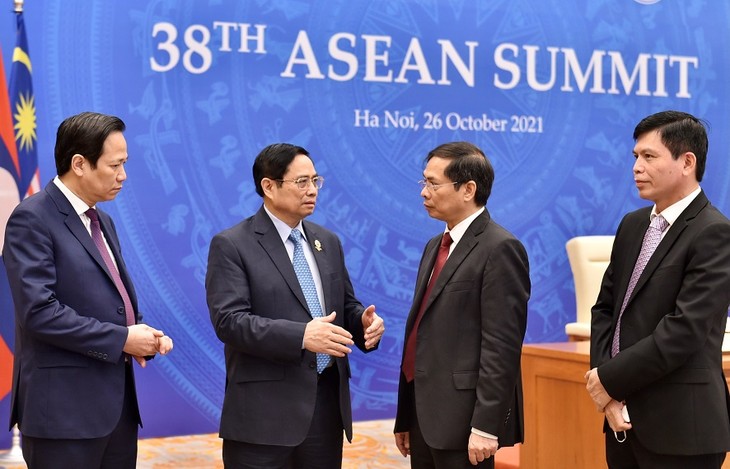(VOVWORLD) - The leaders of ASEAN countries on Tuesday began the ASEAN Summits and related meetings with partners, including the ASEAN+3 Summit and the East Asia Summit (EAS). The COVID-19 pandemic and fierce competition between major countries have created challenges for ASEAN. The 38th and 39th ASEAN Summits will create opportunities for ASEAN to promote its priorities, values, and central role.
 Prime Minister Pham Minh Chinh and Vietnamese delegates at the 38th ASEAN Summit (VGP/Nhat Bac) Prime Minister Pham Minh Chinh and Vietnamese delegates at the 38th ASEAN Summit (VGP/Nhat Bac) |
The Summits put ASEAN at the center of regional issues – Myanmar, the Korean Peninsula, the East Sea, the COVID-19 pandemic, economic recovery, and sustainable development.
Finding a common voice in a challenging world
The Summits take place with ASEAN facing the impacts of COVID-19 on every country’s socio-economy. Vaccine production and distribution is the most immediate problem. So far ASEAN has not obtained sufficient doses of vaccine.
ASEAN has agreed to establish a travel corridor as a measure to recover the economy, but easing travel restrictions runs the risk of undermining pandemic prevention and control. Natural disasters, regional security, and competition between major countries are other shared challenges.
At the Summit meetings, ASEAN will continue to promote unity and internal strength and other principles set out in the ASEAN Charter. ASEAN countries will work together to assert ASEAN’s central role, promote ASEAN-led mechanisms, and show a unified stance in its relationship with partners.
Confirming ASEAN’s central role in regional and global issues
In addition to resolving internal problems, ASEAN will strengthen and expand relations with its partners, including China, Japan, the Republic of Korea, India, the US, Australia, and Russia and reinforce its central role in ASEAN-led mechanisms like ASEAN+3 and the East Asia Summit (EAS). ASEAN has balanced its relations with partners and encouraged them to help handle the COVID-19 pandemic and other challenges.
Separate Special Foreign Ministers’ Meetings were held between ASEAN and China in June and Russia and the US in July. ASEAN countries agreed to organize the ASEAN-G7 Foreign Ministers’ Meeting in London in December.
ASEAN has granted dialogue partner status to the UK and the status of ASEAN Sectorial Dialogue Partner to the United Arab Emirates. It is considering proposals from China and Australia to promote their relationship to a comprehensive strategic partnership.
ASEAN reacted promptly to Myanmar’s political situation, approving and implementing a 5-point consensus in April. The East Sea (known internationally as the South China Sea) has continued to be a concern of ASEAN countries and partners. ASEAN has firmly upheld the stance of respecting international law, including the 1982 UN Convention on the Law of the Sea (UNCLOS), the importance of peace, stability, security, safety, freedom of navigation and aviation in the East Sea, full compliance with the Declaration on the Conduct of Parties in the East Sea (DOC), and early finalization of the Code of Conduct of Parties in the East Sea.
These measures define ASEAN’s role in the regional structure. Each country has its own interests and priorities. The ASEAN Summit is an opportunity to make each country’s concerns part of a shared responsibility that upholds ASEAN’s priorities, values, and central role.